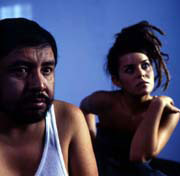 |
 |
 |
 News Around the Republic of Mexico | May 2005 News Around the Republic of Mexico | May 2005  
All Eyes On Mexico As Cannes Fest Wrapping Up
 El Universal El Universal


| | In this narrative, the seemingly immoral behavior of three "lost souls" living in Mexico City is notable in a world in which such behavior has come to be regarded as utterly moral. |
Though only one Mexican film is in competition for the Palme d'Or, Carlos Reygadas' "Batalla en el Cielo" (Battle in Heaven), Mexican cinema had its greatest presence in history at the 58th Cannes Film Festival with the presentation of 23 works (nine full-length features, two documentaries, 11 shorts and an animation).

When asked why there was such a large contingent of Mexican film this year, Thierry Fremaux artistic director for the festival said, "Mexican cinema is one of the greatest and deserves recognition."

The festival, held in the south of France, began May 11 and will end with the closing prize announcement ceremony Sun., May 22. It featured Mexican cinema in a variety of special programs including new films by Regyadas, Amat Escalante and Cannes-regular Arturo Ripstein, as well as classics from Luis Buñuel and Emilio "Indio" Fernández.

In the full-length film category, the most-hyped project was the highly controversial "Batalla en el cielo." A harsh psychological drama coming from director Carlos Reygadas whose first film "Japon" showed in the Cannes' Directors' Fortnight program in 2002, drew criticism for a sex scene featuring an elderly woman.

"Batalla" includes two graphic sex scenes: one between two very un-sexy kidnappers and another featuring acts between a teenage girl and a middle-aged man. The audience booed and hissed at the film's screening in reaction to the scenes, but Reygadas was quick to rebut his critics saying that the scenes were not meant to be arousing or pornographic in any way, but instead were included to portray realism.

Also on view was Escalante's work, "Sange." Incidentally, Esclante was an assistant director to Reygadas' "Batalla en el cielo."

Two documentaries receiving attention are Arturo Ripstein's entry into the Critics' Week program, "Los heroes y el tiempo" (Heroes and time) which follows the lives of four ex-guerrillas from the 1970s and the film "Trópico de Cáncer" featuring the lives of families in San Luis Potósi who hunt animals to sell on the roadside in order to survive.

Short films shown were Matías Meyer's "El pasajero" (The Passenger) about someone who hires a taxi for one day and the animated "De raíz" (literally "From the root") by Carlos Carrera of "El crimen del padre Amaro" fame.

In a section titled "Cannes Classics," which opened Tues., May 17, four masterworks from the nation's "Golden Age of Cinema" were put on display. Three films were shown by Emilio "Indio" Fernández, whose "María Candelaria" won the Grand Prize at Cannes in 1946. The three Fernández masterpieces, "La Perla" (from John Steinbeck's "The Pearl"), "Enamorada" (The one in love), and "Salón Mexico," ran alongside another of the country's best films, "Los olvidados" (The forgotten) by movie maestro Luis Buñuel. Spanish-born Buñuel made the film in Mexico while in exile from the fascist Franco regime in Spain. The tale of cruelty of life on the streets is known both for its harsh realism and surrealistic vision. A recently remastered print was screened that used painstaking techniques to assure fidelity to the original negatives.

The stars out for the festival included Gael García Bernal who was promoting his film "The King" from British director James Marsh and Salma Hayek who came to push "Sin City" the Robert Rodriguez and Frank Miller noir-crime film adapted from Miller's own graphic novel of the same name. | 
 | |
 |



